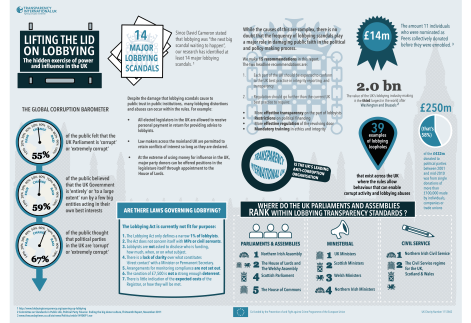Should a political party tell the public what it believes, or should it ask the public what it wants? So goes a beloved dilemma of political theorists and party policy-makers over the years – from long since before the internet came to prominence.
Of course, there is no easy answer to it; particularly when individually each MP (irrespective of party affiliation) may be subject to external influence by PRs or the corporations for whom they are working.
The UKPAC definition of lobbying claims that it means working:
in a professional capacity, attempting to influence, or advising those who wish to influence, the United Kingdom Government, Parliament, the devolved legislatures or administrations, regional or local government or other public bodies on any matter within their competence.
In the UK, lobbying plays a significant role in the way that policies and decisions are made at local, regional and national levels, as lobbyists attempt to influence the formulation of legislation in ways that benefit their clients. Most lobbying activity is undertaken by professional public affairs agencies who represent multiple clients and primarily focus on lobbying within the corporate, charity and trade sectors.
Although I believe that working to influence political decisions regarding policy and legislation is a legitimate and moreover a necessary part of the democratic process, I do think that there needs to be a wider and more fair level of engagement in the process, with more transparency as to the dealings between Whitehall and lobbyists.
In 2010, David Cameron said that lobbying was “the next big scandal waiting to happen” and subsequently ‘promised’ to “sort it out”. However last year, the issues within lobbying reached a level where (according to a TI poll) 90% of UK respondents believed that “our government is run by a few big entities acting in their own interest”
A Lobbying Act was implemented in January 2014 in an attempt to rectify the poor reputation of lobbyists that had been steadily growing over the past decade (some of which are shown below).

On February 10th however, the Chartered Institute of Public Relations revealed its manifesto for the upcoming year which raised seven key areas that the public relations profession wants to see addressed (both in the industry and beyond), namely:
- Lobbying
- The future of corporate governance,
- Independent practitioners and future skills needs,
- The gender pay gap,
- Data protection,
- Internet governance and broadband.
Lobbying
For the last few years, the CIPR has been calling on government to actively support higher levels of accountability and standards within lobbying. Althoguh this did pay off last year in the Lobbying Act, but understandably (as shown in the above infographic), there is still a fair way to go.
CIPR president, Sarah Pinch, says, “The next UK Government should seek to restart the dialogue with stakeholders on the role of lobbying in our democracy, and actively support the development of a highly skilled, qualified and ethically competent group of public affairs professionals that serve the needs of a modern complex democracy. Ensuring that the law that introduced a statutory register of consultant lobbyists genuinely provides the public with more information about how policies and laws are shaped should be considered a priority. Failure to do so will result in lobbying genuinely being the next big scandal waiting to happen.”
The Gender pay gap
The gender pay gap is another prominent issue that is regularly discussed in the public relations industry. The CIPR suggests that future governments need to dedicate themselves to strengthening the Equal Pay act, ensuring it is universally applied. The State of the Profession report, due to be revealed sometime this week, will contain up-to-date information on the size of the current income gap, but last year’s study showed that the gap between men and women was as large as £12,390 in senior roles.
Pinch adds, “Looking outside of our traditional areas of influence, some of the really big questions facing our society – internet governance, data protection – have (so far) not figured largely in contemporary political debate, but our future government will need to take a lead on finding answers to them.’
“Most of these issues are not ones for which a government can simply legislate, and most of them do not have a simple, straightforward solution. Rather, they require an open and informed public conversation which will allow us to arrive at a sustainable set of policies and maintain the UK’s world lead in what are critically important areas.”


